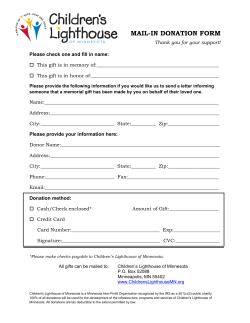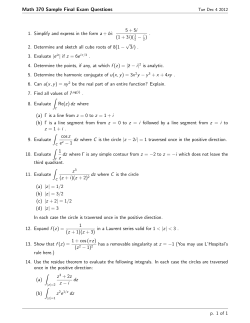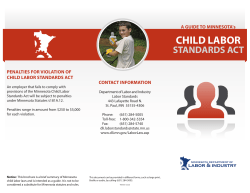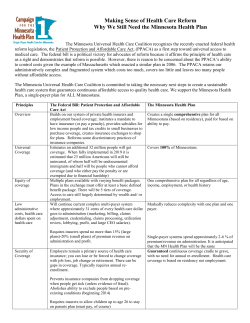
Minnesota Comprehensive Assessments-Series III Mathematics Item Sampler Grade 4
Minnesota Comprehensive Assessments-Series III Mathematics Item Sampler Grade 4 State of Minnesota © Copyright Minnesota Department of Education Roseville, MN 55113-4266 Mathematics Test General Directions to the Student • This test contains two segments. You will be told when to begin each segment. • Your answers must be marked in your answer document, but you may write in this test book as scratch paper. • This test has multiple-choice questions. • For each question, choose the answer you think is best. Answer each question by filling the circle in your answer document. Each circle must be filled in completely for your answer to be scored. • The sample question shows an example of the questions that will be on the test. The sample question shows the answer filled in correctly. Sample Question: 20 − 8 = A. B. C. D. Sample Answer: A 8 10 12 16 B C D • You may not use a calculator for Segment 1. • You may use a calculator for Segment 2. • When you finish a segment of the test, stop and check your answers. Then use the sticker given to you to seal it. Once you seal a segment, you cannot go back to it. Each segment must be sealed before you move on to the next segment. NOTICE: THESE TEST ITEMS ARE SECURE MATERIALS AND MAY NOT BE COPIED OR DUPLICATED IN ANY WAY. This reflects the information on the actual test. The item sampler test book may be duplicated. 3 4 Put sticker here Segment 1 You will be told when to begin this segment. You MAY NOT use a calculator for this segment. 5 Mathematics Test — Segment 1 1 1. There are 35 students going on a class trip. The students ride in vans. There are 7 students riding in each van. How many vans are needed to take all the students? A. B. C. D. 4 5 6 7 2. A truck has 50 boxes of jump ropes. Each box contains 100 jump ropes. How many jump ropes are on the truck? A. B. C. D. 50 500 5,000 50,000 6 Go on to the next page. 3. Two numbers are multiplied together. 1 724 ×8 62,264 Which digit goes in the box? A. B. C. D. 0 1 4 6 4. Divide. 908 ÷ 4 A. 202 B. 212 C. 227 D. 247 7 Go on to the next page. 5. What is 9.582 rounded to the nearest tenth? 1 A. B. C. D. 9.5 9.58 9.6 10 6. Robert has 54 pencils. He has 1 box of pencils and 3 packages of pencils. The box has 24 pencils. Which equation can be used to find p, the number of pencils in each package? A. B. C. D. p = 54 + 3 × 24 24 = 54 + 3 × p 54 = 3 + 24 × p 54 = 24 + 3 × p 8 Go on to the next page. 7. A figure is shown. 1 Which shows a 90° counterclockwise rotation of the figure? A. B. C. D. 9 Go on to the next page. Put sticker here This is the end of Segment 1 . Check your work. Then seal this segment. 10 You will be told when to begin this segment. You MAY use a calculator for this segment. 11 Put sticker here Segment 2 Mathematics Test — Segment 2 8. A fraction model is shown. Which shows an equivalent fraction? A. B. C. D. 2 12 Go on to the next page. 9. Which point is shown at 2 ? 3 W 0 A. B. C. D. X Y 1 2 Z 3 W X Y Z 2 10. In the number 200.358, which digit is in the hundredths place? A. B. C. D. 2 3 5 8 13 Go on to the next page. 11. Which shape is a rhombus? A. B. C. D. 2 12. An angle is shown. Which describes the angle? A. B. C. D. Acute Obtuse Right Straight 14 Go on to the next page. 13. The shape of a floor is shown. 8 ft. 12 ft. 5 ft. 15 ft. What is the area of the floor? A. B. C. D. 2 40 sq. ft. 131 sq. ft. 171 sq. ft. 180 sq. ft. 15 Go on to the next page. 14. A shape is shown. Which shows a translation of the shape? A. B. C. D. 2 16 Go on to the next page. 15. A student creates a time line for a history project. Which shows a time line? A. 1981 1965 1942 1908 1892 B. 1892 1908 1942 1965 1981 C. 1908 1942 1965 1981 1892 2 D. 1892 1908 1942 1965 1981 16. A camping group bought 15 sleeping bags that cost $42 each and a tent that cost $160. What was the total cost of the sleeping bags and the tent? A. B. C. D. $217 $630 $790 $2,442 17 Go on to the next page. 17. Jason has 8 cupcakes. He eats 1 of the cupcakes and gives 2 of the cupcakes to his friends. 8 8 What fraction of the cupcakes are left? 2 A. 1 8 B. 3 8 C. 5 8 D. 3 5 18 Go on to the next page. 18. A decimal number is shown on a grid. Which number is less than the number shown on the grid? A. B. C. D. 2 0.9 0.48 0.450 0.275 19. Which fraction is equivalent to 0.23? A. 1 23 B. 23 10 C. 23 100 D. 2 3 19 Go on to the next page. 20. A table is shown. f g 4 8 16 2 4 8 What rule was used to make the table? A. g = 2f B. g= f C. g = f +2 D. g = 2f + 2 2 2 21. An equation is shown. 12 5 = 17 + 43 Which symbol makes the equation true? A. B. C. D. + − × ÷ 20 Go on to the next page. 22. Which statement is true about an obtuse triangle? A. B. C. D. It It It It has has can can 2 acute angles. 2 obtuse angles. be a right triangle. be an acute triangle. 2 23. Which shows a line of symmetry? A. B. C. D. 21 Go on to the next page. 24. Kira is using 1-inch square tiles to cover a table top. The table top is 24 inches long and 18 inches wide. She lays the tiles into strips of 6. How many strips of tiles will Kira need to cover the table with no gaps or overlaps? A. B. C. D. 14 18 72 432 2 22 Go on to the next page. 25. Ron draws a trapezoid, then rotates it 90°. Which statement is true about the 2 trapezoids? A. They are congruent because all trapezoids are congruent. B. They are congruent because rotating a trapezoid does not change its size and shape. C. They are not congruent because rotating the trapezoid changes its side lengths. D. They are not congruent because rotating the trapezoid changes its angle measures. 23 Go on to the next page. 2 Put sticker here This is the end of Segment 2 . Check your work. Then seal this segment. 24 555272-10401010015 SERIAL# STUDENT'S FIRST NAME M 0000000000000 1111111111111 2222222222222 3333333333333 4444444444444 5555555555555 6666666666666 7777777777777 8888888888888 9999999999999 0000000000 1111111111 2222222222 3333333333 4444444444 5555555555 6666666666 7777777777 8888888888 9999999999 ` 18 ` BR ` MS ` TD ` AT ` 24 ` MC ` 0A ` SC RESPONSE MARSS NUMBER ` REF ACCOMMODATIONS PRESENTATION MARSS LOC DIST DATA ` ABS ` ME ` INV ` NE TEST CODES ` Male ` Home Schooled ` New-to-Country ` Significant Gap in Enrollment ` Female GENDER Spring 2012 SCHOOL USE ONLY BIRTH DATE MONTH DAY YEAR ` JAN ` FEB ` MAR 00 000 ` APR 111 11 ` MAY 222 2 ` JUN 33 3 4 4 ` JUL 5 5 ` AUG ` SEP 6 6 ` OCT 7 77 ` NOV 8 88 9 999 ` DEC Grade 4 Mathematics Answer Document Minnesota Comprehensive Assessments— Series III `````````````````````````````` ``````````` AAAAAAAAAAAAAAAAAAAAAAAAAAAAAA AAAAAAAAAAA BBBBBBBBBBBBBBBBBBBBBBBBBBBBBB BBBBBBBBBBB CCCCCCCCCCCCCCCCCCCCCCCCCCCCCC CCCCCCCCCCC DDDDDDDDDDDDDDDDDDDDDDDDDDDDDD DDDDDDDDDDD EEEEEEEEEEEEEEEEEEEEEEEEEEEEEE EEEEEEEEEEE FFFFFFFFFFFFFFFFFFFFFFFFFFFFFF FFFFFFFFFFF GGGGGGGGGGGGGGGGGGGGGGGGGGGGGG GGGGGGGGGGG HHHHHHHHHHHHHHHHHHHHHHHHHHHHHH HHHHHHHHHHH IIIIIIIIIIIIIIIIIIIIIIIIIIIIII IIIIIIIIIII JJJJJJJJJJJJJJJJJJJJJJJJJJJJJJ JJJJJJJJJJJ KKKKKKKKKKKKKKKKKKKKKKKKKKKKKK KKKKKKKKKKK LLLLLLLLLLLLLLLLLLLLLLLLLLLLLL LLLLLLLLLLL MMMMMMMMMMMMMMMMMMMMMMMMMMMMMM MMMMMMMMMMM NNNNNNNNNNNNNNNNNNNNNNNNNNNNNN NNNNNNNNNNN OOOOOOOOOOOOOOOOOOOOOOOOOOOOOO OOOOOOOOOOO PPPPPPPPPPPPPPPPPPPPPPPPPPPPPP PPPPPPPPPPP QQQQQQQQQQQQQQQQQQQQQQQQQQQQQQ QQQQQQQQQQQ RRRRRRRRRRRRRRRRRRRRRRRRRRRRRR RRRRRRRRRRR SSSSSSSSSSSSSSSSSSSSSSSSSSSSSS SSSSSSSSSSS TTTTTTTTTTTTTTTTTTTTTTTTTTTTTT TTTTTTTTTTT UUUUUUUUUUUUUUUUUUUUUUUUUUUUUU UUUUUUUUUUU VVVVVVVVVVVVVVVVVVVVVVVVVVVVVV VVVVVVVVVVV WWWWWWWWWWWWWWWWWWWWWWWWWWWWWW WWWWWWWWWWW XXXXXXXXXXXXXXXXXXXXXXXXXXXXXX XXXXXXXXXXX YYYYYYYYYYYYYYYYYYYYYYYYYYYYYY YYYYYYYYYYY ZZZZZZZZZZZZZZZZZZZZZZZZZZZZZZ ZZZZZZZZZZZ ---------------------------------------,,,,,,,,,,,,,,,,,,,,,,,,,,,,,, ,,,,,,,,,,, STUDENT'S LAST NAME ALIGN TOP OF LABEL HERE Grade 4 Answer Document Mathematics Test — Segment 1 1. 2. 3. A A A B B B C C C D D D 4. 5. A A B B C C D D 6. 7. A A B B C C D D 20. 21. 22. 23. 24. 25. A A A A A A B B B B B B C C C C C C D D D D D D Mathematics Test — Segment 2 8. 9. 10. 11. 12. 13. A A A A A A B B B B B B C C C C C C D D D D D D 14. 15. 16. 17. 18. 19. A A A A A A B B B B B B 2 C C C C C C D D D D D D Grade 4 Teacher’s Guide MCA Item Sampler Teacher’s Guide mde.testing@state.mn.us An Introduction to the MCA The Minnesota Comprehensive Assessments are reading, mathematics and science tests that help schools and districts measure student progress toward the state’s academic standards. In 2006, the reading and mathematics tests were aligned to the 2003 Minnesota Academic Standards and were named the Minnesota Comprehensive Assessment-Series II (MCA-II). The Science MCA-IIs became operational in 2008 and are aligned to the 2003 Minnesota Academic Standards. The grades 3–8 mathematics assessments will be operational in 2011 as the Minnesota Comprehensive Assessments-Series III (MCA-III) and are aligned to the 2007 Minnesota Academic Standards. The Purpose of the MCA Item Samplers An item sampler is not a complete test. It contains a smaller number of the items that students will see on a full-length test in the spring. The MCA Item Samplers were developed to familiarize students and teachers with the format of the MCA and the kinds of items that will appear on them. This MCA Item Sampler is not a real test. It should not be used to predict how well students will do on the tests. However, students may feel more comfortable with the tests if they have reviewed the Item Samplers prior to the test. How the MCA Item Samplers Were Created The Item Samplers mirror the format of the MCA. The student directions, segment layouts, and answer sheet each reflect the way the test will look in the spring, except that the Item Sampler is shorter than the actual test. As with all MCAs, the reading passages and the math and reading questions have been thoroughly reviewed by Minnesota teachers prior to testing. Minnesota students have answered these questions on previous tests. The distribution of question types and their aligned content selected for the Item Sampler generally reflects a range of items from each strand in the Minnesota Academic Standards. Whenever possible, the Item Samplers have the following designs: 29 Grade 4 Teacher’s Guide Math: • • Two segments o Segment One does not allow a student to use a calculator. o The actual MCA has four segments. Approximately twenty-five multiple-choice items The Contents of This Teacher’s Guide The Answer Key identifies the answers and solutions to the questions. It also identifies the strand/standard/benchmark from the Minnesota Academic Standards for the question. State Standards & Test Specifications The Item Samplers are primarily intended to familiarize teachers and students with the format of the MCA. The best preparation for the content of the MCA is done as a part of your curriculum planning. When doing that, reference the Minnesota Academic Standards and the test specifications for the MCA. For further questions about the MCA, email us at mde.testing@state.mn.us. 30 Grade 4 Teacher’s Guide MCA-III Item Sampler Answer Key Grade 4 Math Item # Correct Answer Item Type Strand Standard Benchmark 1 2 3 4 5 6 7 8 9 10 11 12 13 14 15 16 17 18 19 20 21 22 23 24 25 B C D C C D B D A C B A B B D C C D C B C A B C B MC MC MC MC MC MC MC MC MC MC MC MC MC MC MC MC MC MC MC MC MC MC MC MC MC 1 1 1 1 1 2 3 1 1 1 3 3 3 3 4 1 1 1 1 2 2 3 3 3 1 1 1 1 1 2 2 3 2 2 2 1 2 2 3 1 1 2 2 2 1 2 1 3 2 3 01 02 03 06 07 02 03 01 02 04 02 02 04 01 01 05 03 05 06 01 01 01 02 03 04 31 Grade 4 Teacher’s Guide Item # — The number of the question in the Item Sampler. Correct Answer — Answers to multiple-choice questions are listed. Item Type — Multiple Choice (MC) Calculator Designation — CL indicated that a calculator can be used on this item, NC indicates a student cannot use a calculator. Strand — In mathematics, the MCA-III measures four strands: 1. 2. 3. 4. Number and Operation Algebra Geometry and Measurement Data Analysis and Probability Standard — Each strand has one or more standards. Benchmark — Each standard has one or more benchmarks. See the Academic Standards or test specification for further explanation of each benchmark. Cognitive Level — The level of cognitive demand focuses on the type and level of thinking and reasoning required of the student on a particular item. MCA-III and MCA-Modified levels of cognitive complexity are based on Norman L. Webb’s Depth of Knowledge levels. See the test specifications for further explanation. Level 1: Recall Level 2: Skills/Concept Level 3: Strategic Thinking 32
© Copyright 2025














